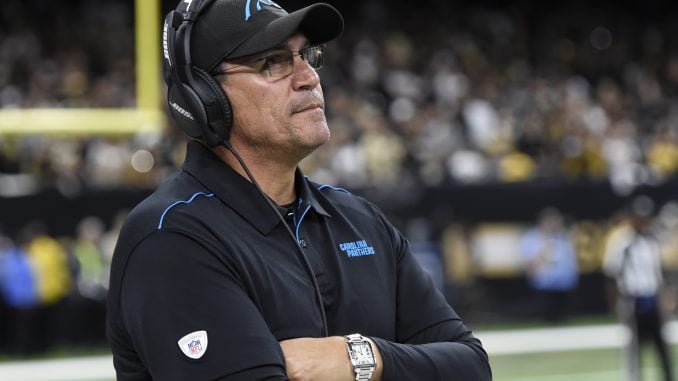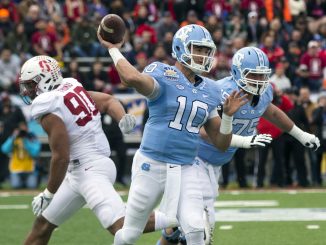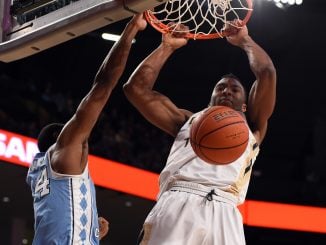
Cancer is something that will touch everyone’s life at some point. For those of us fortunate not to get a diagnosis or a scare, there are friends and relatives who won’t be so fortunate. Shawn Krest has been chosen by the American Cancer Society as one of the Real Men Wear Pink ambassadors for October, which is Breast Cancer Awareness Month. Each day of the month, he’ll be telling a story of how cancer has touched someone on one of the teams we root for. It could be a coach, a player, a retired legend or an arena worker. The disease doesn’t care how successful you are, how much money you have or, as we see in today’s post, whether you are one of the toughest guys in the NFL. To join in the fight against breast cancer, you can visit Shawn’s American Cancer Society page.
In August, the Washington Football Team traveled to New England for a preseason game against the Patriots. That gave Washington head coach Ron Rivera — who coached the Carolina Panthers to the Super Bowl in 2015 — a chance to have dinner at one of his favorite seafood restaurants.
It was a letdown.
“I couldn’t eat it all, and I love the seafood,” Rivera complained to Sports Illustrated’s Albert Breer after returning from the Rhode Island eatery. “But I just can’t. It’s too hard to swallow. That’s still frustrating. It’s hard still to taste; I don’t taste everything yet either. So there’s all these little things, these little indicators, that bring me back: You’re not there yet.”
In the summer of 2020, Rivera noticed a lump on his neck while shaving and got a prescription for antibiotics, thinking it might be swollen lymph nodes due to an infection.
The lump didn’t go away, and, after a few more visits with the doctor, he got the news — Rivera had squamous cell carcinoma.
“When I first got diagnosed, I was mad,” Rivera told NBC Sports. “It really pissed me off.”
A former linebacker for the Chicago Bears’ Super Bowl champions, Rivera had a reputation as a tough guy as a player and a no-nonsense head coach. He was hired by Washington to clean up a franchise that was a mess on the field and in the front office in recent years.
This would be a first for the 58-year-old Rivera, however.
“Ron went nine years in the NFL and never had a surgery,” his wife, Stephanie, told NBC. “So I was really worried about how he would be as a patient. But they said it was going to be tough. There were going to be low moments with the radiation therapy and the chemo.”
Coaching an NFL team, especially one trying to rebuild, is a nearly 24/7 job, with many pro coaches spending nights on a cot in the office to devote as much time as possible to breaking down film and preparing game plans.
Now, in addition to that, Rivera would be undergoing cancer treatments.
He could have taken a leave of absence and turned the team over to an assistant on an interim basis, but Rivera refused. He remembered his brother Mickey’s battle with cancer. Mickey died of pancreatic cancer in 2015.
“Remembering what he went through and how courageous he was. Mickey would never complain,” Rivera said to NBC. “That was the thing that was amazing. I thought about that a lot, that I am very fortunate.”
He had to make some adjustments to his schedule. He began taking two half-hour breaks each day, one in the morning and one in the late afternoon. That may not seem like much, but for an NFL coach it’s the equivalent of playing hooky with a day at the beach.
“As soon as I’m done here, I’m headed to my treatments,” Rivera said at one post-practice press conference. He missed one practice entirely, because of a conflict with treatment — but just one.
Rivera began drinking more water, learning quickly the value of staying hydrated while undergoing chemo. In last season’s opening game against Philadelphia, he was late getting back to the field for the third quarter because he was getting a halftime IV in the locker room.
He got treatment Monday, Tuesday and Wednesday of each week and began using a golf cart to help him get to and from the field on those days. He told Sports Illustrated his time in the cart gave him time to reflect on what he was going through.
“Every time I had to sit down, it would just … I’d put my leg up and be like, f—, this is tough,” he said. “And it would really kind of well up. But every time I’d get up, I’d feel a little something extra. So I’d say the moments I’d have were when I’d sit in that cart and just look out and think about, man, you gotta go. Let’s go.”
Last October, he got to ring the bell signifying the end of his treatment.
“It was a kind of surreal and emotional moment,” Rivera told NBC. “When you’re a professional athlete, when you’re a high-profile athlete, the tendency is to feel like you’re Superman and you’re really not. So when something like this happens to me personally, it was a very humbling experience.”
It’s an experience that still impacts him, whether it’s depriving him of tasting his favorite meal or just looking in the mirror.
“My wound, my scars, they’re healing,” he told SI. “Some are going away, but if you look, some are still there.”
Previous stories in the series include the Carolina Hurricanes’ Stelio Mattheos. To donate to the American Cancer Society’s fight against cancer, visit the Real Men Wear Pink campaign page.



